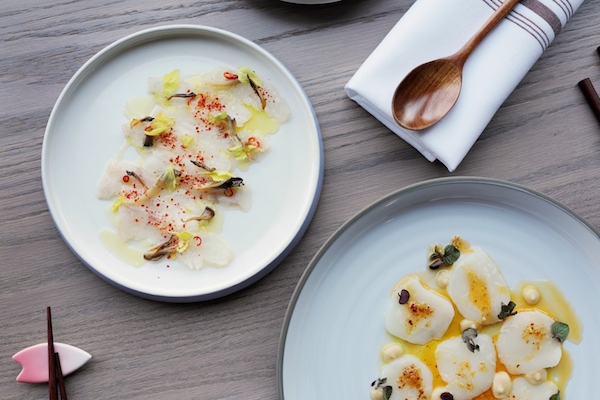Chef Jennifer Kim knows that people might find the cuisine of Passerotto (5420 N. Clark St., Andersonville), her new restaurant, hard to define. The month-old spot introduces an unexpected twist to Korean food: influences from central Italy. To some, the two cuisines might seem totally disparate, but to Kim, they come together naturally. “Eating Italian food brings the same types of comforts that Korean food brings me,” Kim, who is Korean-American, says.
She recalls, as a student at UIC, eating at Italian restaurants on Taylor Street when Korean bites weren’t available. “That’s when I pinpointed that there is a significance to this cuisine that is vastly different than Korean food but still elicits the same emotions when I eat it,” she says.
At the time, the Chicago native was studying to be a pharmacist and had zero interest in cooking professionally. But after a career change, she worked in kitchens at Blackbird and Nico Osteria, then co-founded the acclaimed fish joint, Snaggletooth, which closed last year.
Passerotto, her first solo restaurant, represents something much more personal. The 40-seat space is decorated with an eclectic mix of art (think Bowie prints and macramé hangings), but also on display are old family photographs and traditional hanbok garments Kim had as a child.
“It is such a reflection of myself—that I am unabashedly Korean, but living in Chicago, I’ve had so many different cultural influences that I cannot say that I am just this Korean person,” Kim says. “This was about me being emotionally ready to say, this is something I can share at this point in my life. It’s a scary thing to show something so vulnerable that can be interpreted in so many ways.”

Passerotto’s menu celebrates this mélange of influences. It features plates with flavor profiles you won’t find anywhere else, such as ddukbokki lamb ragu, seolleongtang tortelloni, and cacciucco soondubu—a Tuscan-inspired kimchi broth. Smaller dishes include kimchi pajeon, a crispy chickpea pancake served with ramp pesto.
“I want to make sure I’m doing my best to honor Korean food and culture but also not having to follow what is considered traditional or authentic,” Kim says. “Because the food my parents and grandparents grew up with is vastly different than what I grew up with.”
What excites Kim most, though, is the raw seafood section, as it changes depending on what her purveyors source from Korea and Japan. These dishes pair nicely with Passerotto’s all-natural wine program, which is curated by general manager Tegan Brace. The menu also features a selection of beer and cocktails, but Kim wants to show patrons that Korean food and wine can go well together.

The keywords there, by the way, are “Korean food.” Passerotto has an Italian name—it means “little sparrow,” translating her childhood nickname her father gave her in Korean—but Kim is adamant about classifying it as Korean restaurant.
“At the end of the day, heart and soul, it’s Korean food,” she says. “It’s fine that it doesn't have to be holy. For me, it’s important I do a good job of representing what Korean food can look like.”



